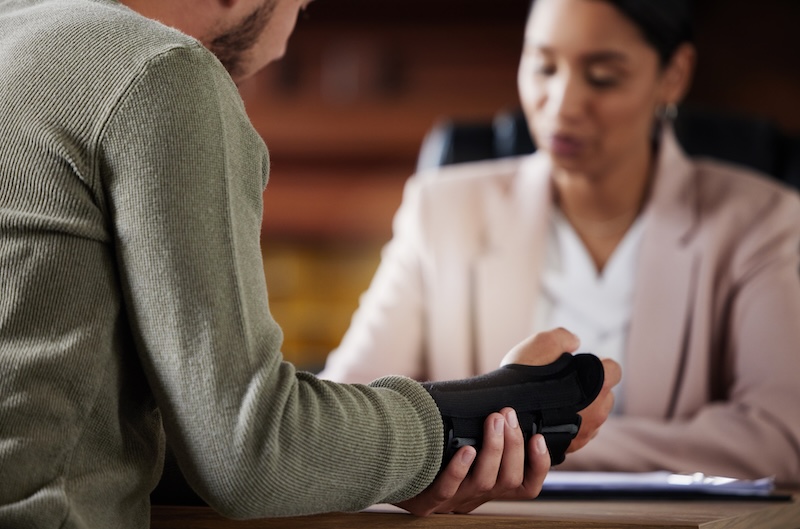What Is Lane Splitting?
Lane splitting occurs when a motorcyclist rides between lanes of moving traffic. Some call it “whitelining” or “stripe-riding,” referring to riding along a painted lane divider. Motorcyclists engage in lane splitting for various reasons, including:
- Bypassing traffic jams.
- Catching up with a riding companion.
- Avoiding stops and starts in slow traffic.
- Maintaining a consistent speed.
Although lane splitting is illegal in most circumstances, there are limited exceptions. For example, law enforcement on motorcycles may lane split while performing emergency duties (e.g., pursuing a dangerous suspect). Lane splitting may also be permissible for an authorized motorcade, escort, or parade. In all cases, the exempt motorcyclists should exercise reasonable care.
What Is Lane Filtering?
Lane filtering is similar to lane splitting but specifically refers to weaving between lanes of stopped traffic to “filter” ahead, usually at a red light. Both are illegal in Virginia.
“Lane splitting” and “lane filtering” are sometimes used interchangeably. The two practices are easy to confuse, as they both involve riding a motorcycle between lanes of traffic. One difference is that lane splitting normally involves moving traffic, while lane filtering occurs during stopped traffic.
What Is Lane Sharing?
“Lane sharing” is different from lane splitting and lane filtering. Instead of riding between two lanes of traffic, lane-sharing cycles ride two abreast within a single lane. Lane sharing is permitted in Virginia under the same governing statute:
“Nothing in this section shall be construed to prohibit two two-wheeled motorcycles from traveling abreast while traveling in a lane designated for one vehicle.”
Riding two abreast is often safer for motorcycles than riding single file. It provides additional visibility by allowing the motorcycles to occupy the full width of their lane. Two side-by-side motorcycles are easier for surrounding drivers to see, especially in low visibility conditions.
Safe lane sharing requires riders to communicate clearly on the road, particularly when turning or changing lanes. Riders should ensure they have the skill to coordinate before lane sharing. Lane-sharing riders must also be careful to obey other traffic laws, including Virginia motorcycle helmet laws.
What Happens If You Are Involved in a Motorcycle Accident While Lane Splitting?
Most states follow a “comparative negligence” rule, allowing plaintiffs partially at fault for their injuries to recover reduced damages. In Virginia, however, lane splitting may interfere with your ability to file a personal injury claim because the commonwealth follows a “contributory negligence” rule, meaning defendants can escape liability by proving that the victim contributed to their accident, even minimally. If your lane splitting contributed to the accident, you will be barred from recovering compensation.
How Can You Protect Your Rights After an Accident?
Following traffic laws and operating your motor vehicle safely is the best way to prevent an accident. However, accidents can occur even when you obey the law.
Again, because Virginia is a contributory negligence state, defendants and their insurers will strive to blame you for your injuries so they can escape liability. Here’s what to do after a motorcycle accident to protect your rights and interests:
- Ensure Safety – Move out of traffic if possible.
- Call 911 – Report the accident and request medical assistance.
- Document the Scene – Take photos and videos of the damaged vehicles, your injuries, and other important evidence.
- Exchange Information – Collect contact and insurance details from all involved parties. Also, gather contact information from witnesses.
- Avoid Admitting Fault – Stick to facts when speaking to defendants and insurers. Do not admit fault, especially before consulting an attorney.
- Contact an Attorney – Consulting an experienced Virginia motorcycle accident lawyer is the best way to protect your rights and explore legal options.
If you’ve been falsely accused of lane splitting or being liable for your accident in another way, an attorney can utilize resources such as expert witnesses, dash cam footage, and crash reconstructionists to prove the true facts of the accident.
Let Cooper Hurley Injury Lawyers Handle Your Virginia Motorcycle Accident Claim
Consult our skilled Virginia personal injury lawyers as soon as you are safe and medically stable. At Cooper Hurley Injury Lawyers, personal injury law is all we do. We know Virginia traffic laws inside and out and are here to help you understand your legal rights and options. Call (757) 333-3333 or contact us online to schedule your free consultation. You pay nothing unless we win your case.


